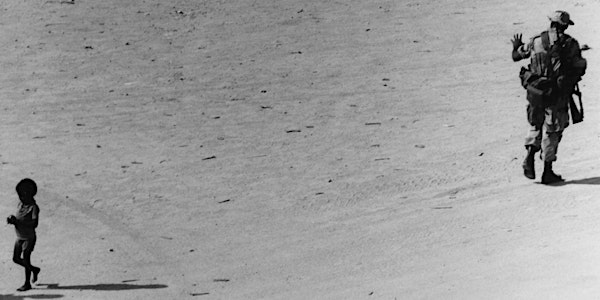
Humanitarian History: Reflections on Somalia
Date and time
Location
Room G010, Hardiman Building
National University of Ireland, Galway University Road Galway IrelandDescription
Humanitarian History: Reflections on Somalia
Moore Institute
Room G010, Hardiman Research Building
National Univeristy of Ireland, Galway
OUTLINE:
This workshop brings together practitioners and academics to reflect on humanitarian action in Somalia since the 1990s. What did and didn’t work in the field? What contextual factors shaped the practice of humanitarian aid? What lessons can we draw from that experience for contemporary policy-making?
PROGRAMME:
Thursday 22 June 2017
13.30-14.30 Arrival, registration & lunch
14.30-17.00 Session 1: Intervention in the post-Cold War era
François Grunewald (Groupe URD)
Anne O’Mahony (Concern Worldwide)
Sally O'Neill (Trócaire)
Reflection:
The end of the Cold War ushered in a new era of international politics. With it came a re-definition of humanitarian 'intervention'. What impact did the shifting priorities of global geopolitics have in the field? What uncertainties did it bring? This session will focus on the militarisation of humanitarian action in the 1990s, its implications for humanitarian 'space', and the growing importance of 'security' for humanitarian agencies. How did they respond to the new realities? What dilemmas did they face? What lessons does their experience suggest for the present-day?
18.30-20.00 Keynote
Geoff Loane (International Committee of the Red Cross)
Chair: Sara Pantuliano (Overseas Development Institute)
Friday 23 June 2017
9.00-11.00 Session 2: Presence & Protection
Michaël Neuman (Médecins sans Frontières CRASH)
Rosemary Heenan (Trócaire)
Reflection:
The withdrawal of United Nations staff from Somalia in 2001 raised important questions about the relationship between the humanitarian community and those it is charged to help. In this session we will reflect on the concepts of ‘presence’ and 'protection' (in its broadest sense): from the need to defend local communities to security training for NGO staff. What are the practicalities of working in an environment like Somalia? Can humanitarian agencies protect local communities when they are reliant on armed escorts to protect themselves? What impact does 'remote control' humanitarianism (working remotely through local staff) have on humanitarian action? What responses do local communities adopt in the absence of humanitarian agencies? What role does civil society play in those situations?
11.00-11.15 Tea/coffee break
11.15-12.45 Session 3: The Normalisation of Crisis
Nisar Majid (Tufts University)
Abdurahman Sharif (Somalia NGO Consortium)
Reflection:
The discourse of humanitarian action shifted again in the 2010s, with the aim of 'stabilising' the region. The effects of that altered discourse are immediately visible: migration and the movement of peoples have become the norm; food security, famine and drought have been recurrent themes; and short-term funding cycles have created cultures of dependency and the acceptance of crisis as the norm. With Somalia facing a new threat of famine, how will local communities respond? Where will people go? How will they (and the humanitarian sector) react in the event of a renewed famine?
12.45-14.00 Session 4: Reflections & Ways Forward
Laurence Binet (Médecins sans Frontières)
Sara Pantuliano (Overseas Development Institute)
Bertrand Taithe (Humanitarian and Conflict Response Institute, University of Manchester)
Reflection:
In this session we will reflect on the conversations of the past two days and point to ways forward in translating the lessons from our discussions into practical actions for the humanitarian community.
This workshop is generously supported by Trócaire and the School of Humanities, NUI Galway, and is funded by an Irish Research Council New Foundations Grant.
Organised by
For further details about the seminars, contact: kevin.k.osullivan@nuigalway.ie